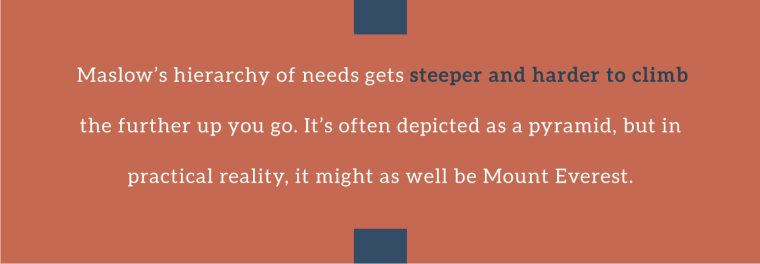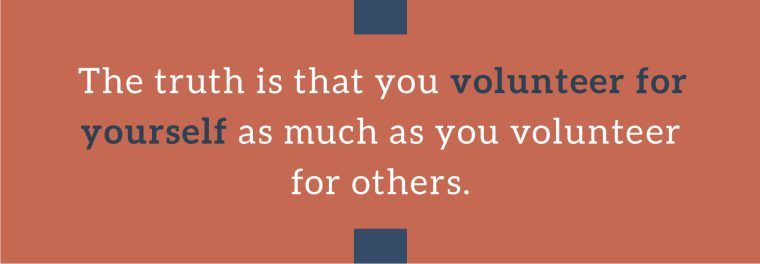The last month of the year is a weird time for business on the internet.
What do I mean? I mean that some people are completely tapped out, but other people want to swing for the fences one last time before bidding the old year adieu—and this is true of both “businesses” and “customers.” ?
I think I’m in the latter camp, business- and newsletter-wise, but I can’t be sure. And even if I were sure… well, you can swing for the fences and still miss. ?
But oh well. Swing I shall, for it’s the penultimate Eating to 100 of 2023 and I have two particularly hard sells that are each worth a hard swing, even if I miss.
The first is a conclusion to my series on the importance of attitude, and the second is a somewhat irreverent case for adding volunteer work—yes, the “for free” kind—to your busy modern life. If I can’t convince you, I’ll settle for amusing you.

This is the third and final part of my series on the importance of attitude, and I’ll get you up to speed with one-sentence summaries of all three parts (including today’s). I might as well earmark the Hegelian-dialectic thing that’s happening here:
Part 1 (Thesis): Good attitude makes a real difference in your health and longevity, and centenarians are living proof of it.
Part 2 (Antithesis): However, maintaining a good attitude does have costs that it’d be unwise to ignore.
Part 3 (Synthesis): To maintain a good attitude over the long haul, we have to do it for our own reasons and we have to understand better how its “costs” really work in context.
Now, to close the loop I’ve summarized above…
I’ll start by doing my best to condense a book-length idea from Gregg Easterbrook to a couple of sentences. That idea is called the Progress Paradox, and it’s really an observation: over the long term, societies tend to become less happy the more developed they are. In other words, people feel less and less satisfied with their lives as more and more of their needs are consistently met.
That might sound peevish and entitled, but it’s a function of human psychology (not any particular generation’s). Essentially…

I bring this up because, as we all know from day-to-day life, a good attitude is definitely helpful for solving problems in front of you (or at least keeping your head screwed on straight). But the natural rewards and reinforcements for a good attitude simply don’t crop up as often when your basic needs are consistently met and when the “problems” in front of you are barely even visible to you.
It’s the epitome of “first-world problems,” to be sure, but “figuring out what to do with your life” is a bigger, more abstract challenge than most people in history have had the privilege of facing. That’s where a lot of us are lucky enough to find ourselves, but alas, it’s also where good attitudes are less consistently rewarded over the long haul.
Having mentioned the bigger context of “good attitude” and its uphill modern challenges, let’s talk about the smaller choices that make good attitude the boon that it is.
The other thinker from whom I’m borrowing heavily is David Foster Wallace, specifically his 2005 commencement address entitled “This Is Water.” I don’t think he ever uses the word ‘attitude’, but that’s a major theme of the speech regardless—and he provides the kind of perspective on attitude that people of all ages (not just graduates) would do well to consider. You can listen here or read a transcript here.
Wallace starts with the important observation that we’re all naturally egocentric, that we all experience life from inside our own heads (and nowhere else). As he puts it:
Think about it: there is no experience you have had that you were not at the absolute center of. […] Other people’s thoughts and feelings have to be communicated to you somehow, but your own are so immediate, urgent, real—you get the idea.
I should mention, at this point, that attitude is a natural feature of our evolution. It is a tool that helps us to adapt and survive whether we think about it or not. Then again, the whole reason for writing a series like this one is to illuminate that many of the tools that help(ed) us survive can prevent us from thriving if we’re not careful.
To use Wallace’s language, our “default setting” is a self-serving attitude—and much of his point is that self-serving attitudes often double as self-defeating attitudes in this society we’re all trying to share peacefully.
We can’t change our egocentrism, but we can adjust for it. We can choose to pay more attention to the thoughts that don’t come quite so quickly or automatically to mind—including many that perfectly embody ‘positive attitude’.
We should do this for two healthy and selfish reasons, short-term and long-term respectively:
1️⃣ Failure to “check ourselves” sets us up for needless frustration and exasperation in day-to-day life. Wallace was wise to point out, very frankly, that a lot of adult life is banal compared to what college graduates tend to expect—and yet this is exactly why “the day-to-day work of choosing” is so important for each of us.
He gives the example of working a long day and then going to the supermarket at rush hour, when the checkout lines are hopelessly backed up, and feeling the fatigue and frustration that might make anyone want to jump out of their skin. Then he says:
The point is that petty, frustrating crap like this is exactly where the work of choosing comes in. Because the traffic jams and crowded aisles and long checkout lines give me time to think, and if I don’t make a conscious decision about how to think and what to pay attention to, I’m going to be pissed and miserable every time I have to go to the store, because my natural default setting is to assume that situations like this are really all about me…
Simply put, a good attitude spares you a lot of those heartaches. For the cost of one or two deliberate thoughts, you can feel a lot less ugh about a lot of little things. That’s a good trade.
2️⃣ Failing to maintain a good attitude makes it easier to (unwittingly) wind up with priorities we didn’t want. As Wallace succinctly put it, everybody worships. The only choice we get is what to worship and, if we don’t choose to worship something spiritual and noble and abstract, whatever worldly thing we worship will probably eat us alive.
They’re tales as old as time (or at least as old as Dante) because they’re true: whatever worldly thing you pick—money, power, sex appeal, intellect—a worshiper can never have enough of it, and the pursuit of it hollows them out in one way or another. But choose what you worship wisely, with love and humility, and it will reward you in ways that far exceed not eating you.
Of course, none of this constitutes a scientific explanation of how good attitudes make such a huge difference in the health and longevity of centenarians. But it makes a certain kind of sense that their persistent focus on the “better angels of our nature” is less a costly sort of piety and more a wisened resistance against the corrosive parts of our nature, the parts that twist us up and turn us on ourselves. It makes a certain kind of sense that they would literally survive longer, that the heartache they save themselves really does add up.
Before we wrap up, I will acknowledge an important difference between the blue zones and most of the rest of us: simply put, they have a little more “buffer” between themselves and modernity. In other words, pretty much all of the blue zones (possible exception of Singapore) are smaller, quieter, more remote places where people can live out their lives without having quite so many complications living among them.
Still, as I’ve said elsewhere about the blue zones’ teachings, we should NOT get to thinking that we have to move there, or somehow import their culture and lifestyle wholesale, to be able to reap the same benefits. We should learn what we can and adapt it to suit our needs.
So, in closing, here are three of my favorite quick suggestions for helping you choose the good attitude that will help you feel better (and live longer) in the grand scheme:
- Try to limit your free-browsing time (particularly if you wind up doom-scrolling) by realizing when it’s happening and taking some action to exert control over it. Remember that it’s often far easier and more realistic to change your exposure to the world than to, well, change the world.
- Exert some control over your environment, not just your choices. This is a huge theme in the blue zones’ teachings, and it applies in so many ways. In today’s case, I would highlight (A) adjusting your household to emphasize the things that bring you deep and genuine satisfaction and (B) putting yourself in positions to make healthy, positive relationships based on shared interests and beliefs, whatever they may be.
- Take a moment to listen to the deeper feelings that are usually suppressed by hurry, by the thought of “I don’t have time for this” or “I can’t get to the bottom of this.” These dismissive thoughts can sometimes conceal little epiphanies just around the corner. Stopping to think about something that you DON’T usually think about can help you to peek around those corners again—and what better time of year to try than now? People do feel a certain newness heading into a new year, so let’s lean into that!

I want to talk now about volunteering—actually, making a case for YOU to consider volunteering—and I’ll start by explaining why I’ve filed this under “Rooted in Relationships” and not “Habits for a Lifetime.” Two quick reasons:
?️ There’s no specific habit of ‘volunteering’ (in our Western sense of the term) that’s universal across all of the blue zones. The blue zones certainly have a caring, communal, service-oriented spirit in common, but there’s no one thing that they all do. The line between “volunteer work with a nametag” and “just being a good neighbor” often gets very blurry in the blue zones.
?️ This article is specifically about how your well-being is rooted in relationships in more ways than you might expect.
So without further ado, here’s my quick and slightly irreverent case for why you should consider volunteering your time in some way!
Note first that just about everybody would agree that volunteering is a good (i.e. commendable) use of time, but a lot of those same people wouldn’t bother to try it themselves. Simply put, most people don’t see what volunteers get out of it; it’s admirable, we all think, but time is money and both resources are scarce enough as it is! Am I right?
We can all be honest. I’m not here to play shame games. I’m just here to help everyone see what the volunteers see—what they might be getting out of it that makes it worth their time.
Part of what makes many volunteers so wonderful is that they DON’T speak the way I’m about to. Many of them might think that what I’m about to say is ass-backwards or tragically cynical, but…

The people who have truly enjoyed volunteer work, who feel that it “gives back” to them in some way, have already learned this on some deeper level—and I say more power to them, because it’s one of the best win-wins in the human world.
Sure, there are a few people who make sure you hear that they volunteer, but never mind them. For every two people I’ve known like that, I’ve caught ten others trying to “do good things without getting caught.” Volunteering becomes a little sanctuary to many, the thing they don’t want spoiled (or misconstrued) by the rest of the world, and this is the unnamed joy in which I want you to be able to share.
Fortunately, I think the same things that explain what can make volunteering worthwhile to the volunteer also explain how you can find and narrow down ideas for yourself. You might be just a Google search away from changing your life!
So as I think of the big-hearted, red-blooded volunteers I’ve known in my lifetime, I would boil it down to these three pieces of advice:
1️⃣ Volunteer for the kinds of causes and/or people that you really want to help. It might seem really heartless to say that you “don’t care” about certain causes, but it’s true in an all-things-relative kind of way. Some causes tug at the heartstrings harder than others, and that’s true for each individual person.
It seems only productive to make this distinction (out loud) because it’s an important distinction any volunteer has to make: they have to care about the cause enough to accept the opportunity cost of directing their energies elsewhere. If you have to focus your attention on one cause at a time, it’s better to have some natural passion for that cause!
If that means helping any group of people, any group you feel drawn to, that’s a great thing. But as long as I’m being frank, your preferred cause might not involve people at all—you might prefer to help the planet, for instance, or its creatures great and small—and your cause is no less noble for that. Again, let’s be honest with ourselves about what we do (and don’t) want out of the good we can do the world!
2️⃣ Volunteer according to your talents, skills, and natural dispositions. You don’t need to be a seasoned expert, or remotely close to one, to make a big difference as a volunteer. In some lucky cases, you can get on-the-job training while you make that big difference!
Having said that, it is probably better (for everyone’s sake, but let’s focus on yours) that you have some kind of “natural fit” with the work you’d be doing. Simply put, anyone can feel good about doing work they already know in directions they truly care about—and no matter what you’re good at, isn’t it kinda fun to be in your element?
3️⃣ Volunteer in ways that already fit into your life (or could fit with some adjustment). If the above two pointers have already gotten you thinking—enough, at least, to keep reading this far—then I’ll help you clear the last little hurdle. It’s small relative to the hurdles above it, but still easy enough to trip over.
The last little hurdle happens when the person pulls up their calendar and (whether earnestly or falsely) simply doesn’t have any openings. To wit, here are my three simple suggestions; they won’t crack every nut, but hopefully they’ll tempt you into trying something that’ll change your life for the better.
- Don’t assume you have to volunteer the same kinds of hours as So-and-So. Some people do a service trip a year, others do a shift a week, others do an hour a day; there’s no right or wrong way to spread the time out.
- Don’t assume that you have to go somewhere to volunteer. This is the digital age, baby! There’s a surprising amount you can do from home—tutoring in all sorts of subjects, reading for the blind, you name it—and it’s worth a Google search with the other parameters of your choosing.
- Ask yourself if you’re certain that some of the spots you keep open for yourself will be more fulfilling than volunteering. I’ve enjoyed a few binge-watches myself, but if global viewing stats are any indication, most people could make themselves feel better by sacrificing a few marathons to try something new!

Easy Slow-Cooker Apple Butter

Ingredients
5 pounds apples (Macintosh or golden delicious work well), peeled, cored, and sliced
½ cup apple cider
1 cup brown sugar
½ cup honey
2 teaspoons ground cinnamon
1 teaspoon ground allspice
1 teaspoon nutmeg (optional)
The Method
- Put all ingredients into a slow cooker.
- Cook on high for 2 hours.
- Reduce heat to low and continue cooking for 6-8 hours, or until apples mash easily with a potato masher or spoon.
- Let cool and then store in airtight container(s) in the refrigerator.





